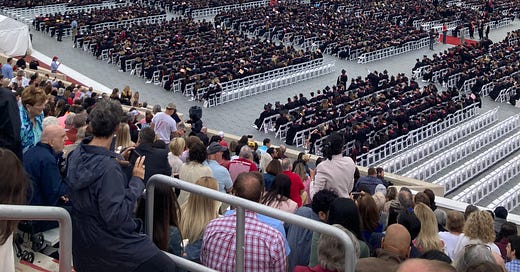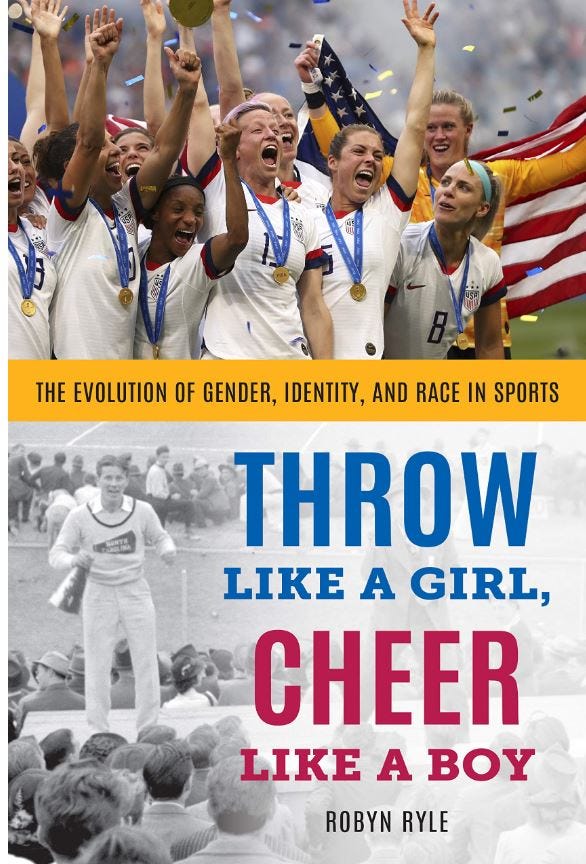There’s a scene in a PBS documentary on social class, People Like Us, that I used to show in my intro class. The context is a battle in a small, Vermont town about whether to allow a big chain grocery store to open or to instead depend on the independent co-op. Food is a very good avenue into social class, but in this particular segment, an older, white lady is in the bread aisle, pulling a slice of Wonder bread out and squeezing it into a little dough ball with great disgust. “This isn’t bread,” she says. And then in discussing the chain store versus the co-op, she says, “We hate big. Big is horrible. Small is beautiful.”
I don’t share that woman’s disdain for Wonder bread (especially a sandwich with Wonder bread, American cheese, Miracle Whip and, yes, rice krispies, a sandwich of my own invention that I ate regularly as a child), but I am sympathetic to her preference for small over big. I like my small town. I often think that Gandhi’s idea of a nation composed of small villages was probably a good idea and maybe the way out of the dead-end democracy finds itself in lately. Like the old woman, I prefer a local store over a big chain.
I went to a small college in Mississippi for undergraduate and I teach at a small college in southern Indiana. It wasn’t in cards but, of course, a part of me wanted my daughter to go to a small college, too. She made it very clear in the early days of her college search that would not be happening. She ended up at Indiana University—the biggest university in the state.
The biggest university in the state, but in a pretty small town—Bloomington. My husband and I had our concerns about what it would be like navigating undergraduate commencement under those conditions. Figure the graduating class is 10,000 at least and each graduate brings five people on average (and based on my observations, I think that’s an underestimate), you’re looking at an additional 50,000 people swelling into a town that when the undergraduates aren’t there, has a population of about 30,000. Daunting, yes?
At a ceremony of that size, held in the football stadium, there’s no way each student can cross the stage for their diploma. Or, I guess they could, but we’d be there for days. Students graduate as a group by college. As someone who’s only experience of graduation is at institutions of about a thousand students, (1) this seemed like a lot to wrap my mind around. How meaningful can a ceremony that big possibly be?
I started to change my mind as my husband and I rounded up on the stadium, part of a massive stream of people headed into the building. Even though I’m involved in commencement ceremonies year after year, I still tend to forget the specific energy they have, which is, in a word, joy. The families are so happy. So bursting with pride. I feel that every year at our own college’s graduation ceremony, which is about 1,000 students. Imagine that multiplied by fifty.
Inside the stadium, we passed lines of students streaming down onto the field through various entrances. We walked and walked and walked, halfway around the stadium, and the lines went on. Students streamed onto the field through eight different entrances and it still took thirty minutes to get all of them onto the field.
When we walked through the entry out into the bleachers my first thought was, “It’s like Star Wars.” You know what I mean. The scene on the Death Star, with the legions of Imperial troops. Imagery stolen, no doubt, from Nazi Germany, so, yes, it was also like that, only without the ick factor.
It was, in other words, a spectacle. A huge football stadium gradually filling with family and friends, while below, undergrads filed in like black ants on the field. All their faces were indistinguishable from that distance, with cameras broadcasting images of them onto the big screens. Out in the concourse, the concession stands were open so people could pick up Chik-fil-A or a hot dog or a pretzel.
It was big. It was different. It was awesome.
Here was a stadium full of what was over 10,000 students, the largest class in IU’s history, plus their friends and family, but everything was organized and orderly. There was water if you got thirsty. Places to buy flowers and stuffed animals for your grad. A first aid station. When I asked the man beside me where he got his program, the man in front of me offered me an extra he’d picked up. When I had to put on an extra layer during the ceremony (the breeze was cold and it was cloudy) and couldn’t get my sweater back on, the people in the row behind untangled it for me.
There we all were, sitting on fairly uncomfortable bleacher seats for almost two hours, depending on how early you arrived. But there was still cooperation, standing to let people pass along the row. One elderly man had to hold onto the people he passed to get to his seat—complete strangers—but they let him, like an embrace. It was a wonder.
In his book about the emotion of awe, Dacher Keltner lists the top sources of awe and right at number two is collective effervescence, that bubbly feeling we get from being together, like at a college graduation, even a really, really big one.
For Emile Durkheim, the sociologist who came up with the term collective effervescence, the phenomenon is proof that society is more than just the collection of individuals. When you put that many people together, you create something that is not reducible to the individual people in the crowd. A force is created that exists outside of us and acts upon us. This force—this collective effervescence—feels like nothing short of magic. It is, for Durkheim, the origins of all religious systems in our attempts as human beings to figure out what the hell that feeling is. Spirit? God? Nature? Sure, why not?
Collective effervescence explains why, in that stadium, I started to have thoughts like, “Yes, maybe I am a Hoosier after all,” despite clinging tenaciously for the last twenty some years of my exile in Indiana to my identity as a Kentuckian. It’s why, despite my general indifference to university spirit during my six years in Bloomington getting my Ph.D., I still raised my arms to make the I-U at the end of the fight song. Why not? For those moments, maybe we were all Hoosiers. If you’d heard the bagpipes in the processional, I feel certain you would have wanted to be a Hoosier, too. Every graduation should have bagpipes.
I don’t know, but after this weekend, I’m thinking big doesn’t have to be bad. Maybe that’s because in the end, every ‘big’ is composed of many ‘smalls.’ The other students in your college. Your family and friends who are there with you. The people in your row. Maybe it has nothing to do with that. I do know that though so much of what passes for ‘civilization’ in the 21st century seems inevitably linked with doom, IU’s commencement was a bright spot—big and beautiful.
Thanks for being here and for reading! Thanks to all the new subscribers and welcome to the You Think Too Much community!
We had a great time last Tuesday at the first workshop on memoir and personal essay. Still spots in the next class, next Tuesday, May 16 from 6-8. Get your tickets here.
Stay tuned also for updates about my young adult novel, FAIR GAME, and opportunities to get your hands on an early copy and get involved spreading the word about this awesome book, which I’m very proud of. It’s the story a girls' basketball team that challenges the boys to a high-stakes game, putting their seasons, their futures and three cherished friendships on the line. Hope to have the cover to share soon.
In other book news, my book about sports, gender, and identity, THROW LIKE A GIRL, CHEER LIKE A BOY, will be coming out in paperback in August. You can preorder a copy here or here. Check out me giving a talk based on one of the chapters from the book here.






You have me crying like a baby. I've always wanted to avoid the big crowds. Didn't go to my own IU graduation. Missed my son's because he went to iupui and didn't partake. You've made me determined to get to my granddaughters next you no matter how or what! And I bet Ann. R. is teary-eyed while reading. Thank you, you don't think to much, you're doing it for the rest of us!
Omg! This is fabulous! I remember feeling all those things at one time or another. Particularly getting help to the middle of a seating section in a theater or a stadium. Thank you so much!